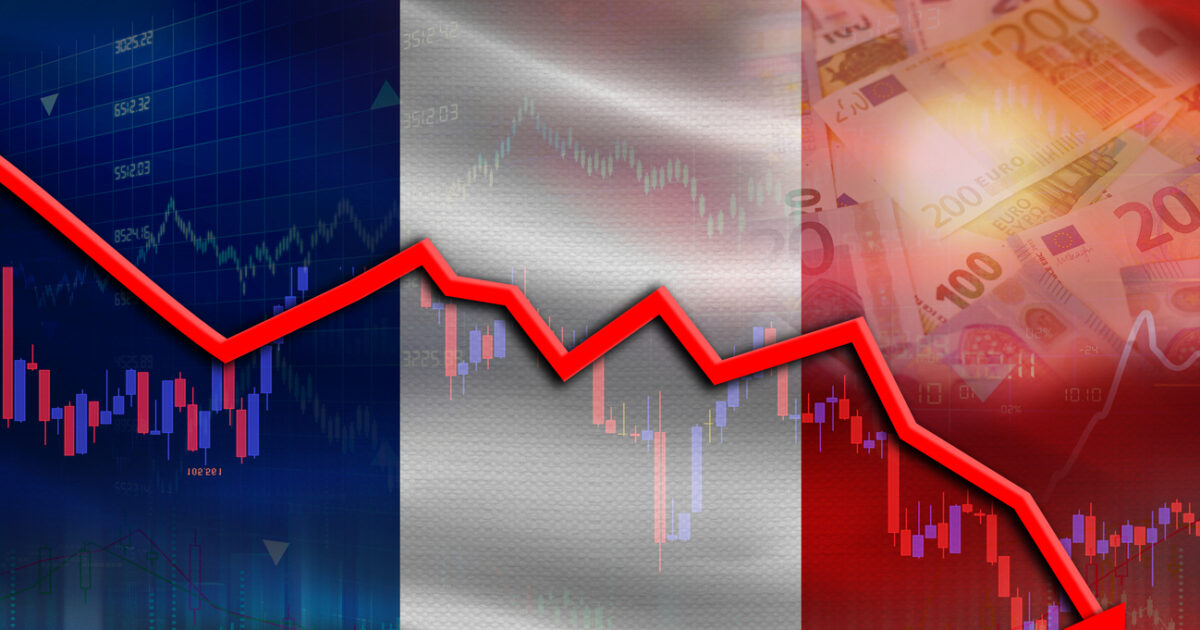From stable to negative, the Moody’s Ratings credit perspective of of Francewarning of the country’s bloated public finances as a weakened minority government struggles to pass the budget.
“The decision to change the outlook to negative reflects the heightened risk that the fragmentation of the country’s political landscape will continue to hamper the functioning of France’s legislative institutions,” Moody’s Ratings said in a statement on Friday (24.10.2025). “This political instability risks hampering the government’s ability to address key policy challenges, such as the widening fiscal deficit, rising debt and the continued rise in borrowing costs.”
France’s rating by Moody’s remains seven notches above junk at Aa3, on par with the UK and the Czech Republic.
France has suffered a series of ratings downgrades in recent weeks, including downgrades by S&P, Fitch and DBRS, as long-running political turmoil escalates and risks turning into a public finance crisis.
The National Assembly has fired two prime ministers in the past year over their fiscal plans, after snap elections split the parliament into irreconcilable minority groups. The last prime minister, Sebastien Lecornu, managed to stay in office only by bowing to pressure from opposition MPs to suspend President Emmanuel Macron’s pension reform, which was aimed at boosting public finances.
Moody’s warned that if the suspension of the reform — which raises the minimum retirement age from 62 to 64 — lasts more than a few years, it will further exacerbate fiscal problems and damage the economy’s growth potential.
Even after the suspension of pension reform, Lecornu remains vulnerable as the Socialists, whose support he relies on to stay in power, threaten to engage in no-confidence votes if the government does not make more concessions in the 2026 budget. Their key demands include fewer spending cuts and a significant increase in taxes on the rich and big businesses.
Adding to the fiscal uncertainty, Lecornu waived the use of a constitutional tool known as Article 49.3, which previous governments relied on to override budget votes when they lacked an absolute majority. It’s unclear how divisive lawmakers will manage to agree on a bill at a time when unpopular spending cuts or tax hikes are needed to bring the runaway deficit under control.
“It is no longer possible to govern the country with the discipline of a single camp, but by cultivating a rigorous debate between MPs who start with different beliefs,” Lecornu said earlier Friday in the National Assembly. “It is the silent revolution of the parliament.”
The initial draft law that Lecornu submitted to parliament this month aims to reduce the budget deficit to 4.7 percent of economic output from 5.4 percent this year. But he said lawmakers have room to negotiate a broader target, as long as the deficit stays within 5 percent and France can hit its long-term target of 3 percent by 2029.
The country’s finance minister, Roland Lescure, said after the rating decision that the government remains committed to an “ambitious” deficit reduction to meet the 2029 target. The rating agency’s negative outlook shows the “absolute necessity” of a budget compromise, he added.
“If it continues, the failure to pass legislation that effectively addresses such political challenges will signal the weakening of the country’s institutions,” Moody’s said. “In the absence of budgets that proactively cut spending or raise revenue, France’s deficits will remain higher for longer than we currently expect.”
Political and fiscal challenges since Macron called elections in June 2024 have triggered massive sales of French assets, raising the country’s borrowing costs.
The spread between French and German 10-year bond yields, a closely watched indicator of risk, has widened as much as 89 basis points in recent weeks, from less than 50 before the snap election. On Friday, it closed at 81 points, the highest level in 11 days.
S&P’s surprise downgrade last week intensified selling pressure as it meant France lost its average AAA rating from the big three credit rating agencies, prompting sales by a number of funds with ultra-strict investment criteria. Others rushed to change their investment rules so they didn’t have to reduce their portfolios.
Moody’s decision to put France on negative outlook comes less than a year after the country’s unscheduled downgrade. However, the move was widely expected by investors given the mounting obstacles to fiscal consolidation and recent downgrades by other companies.
Moody’s said France’s downgrade would be a likely result of further evidence that the country’s ability to weather credit challenges has been “permanently weakened”. This could be evidenced by continued difficulties in curbing the deficit or a long-term pause or reversal of structural reforms, particularly in pensions, he said.
